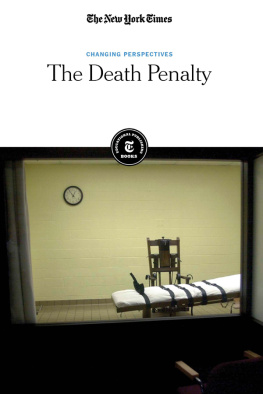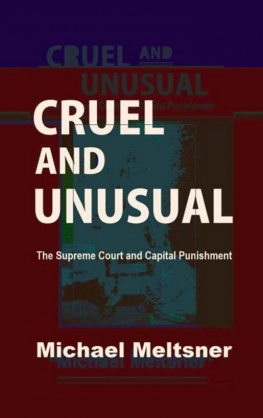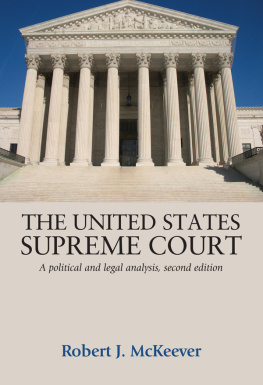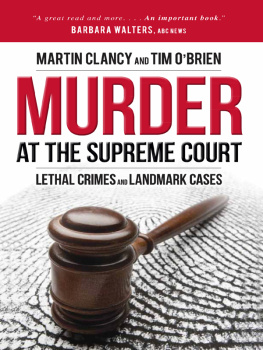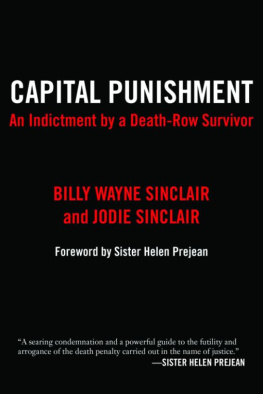MOST DESERVING OF DEATH?
The role of capital punishment in America has been criticised by those for and against the death penalty, by the judiciary, academics, the media and by prison personnel. This book demonstrates that it is the inconsistent and often incoherent jurisprudence of the United states supreme Court which accounts for a system so lacking in public confidence. Using case studies, Kenneth Williams examines issues such as jury selection, ineffective assistance of counsel, the role of race and claims of innocence which affect the Courts decisions and how these decisions are played out in the lower courts, often an inmates last recourse before execution. Discussing international treaties and their lack of impact on capital punishment in America, this book has international appeal and makes an important contribution to legal scholarship. it also provides a unique understanding of the dynamics of an alarmingly problematic system and will be valuable to those interested in human rights and criminal justice.
Most Deserving of Death?
An Analysis of the Supreme Courts Death Penalty Jurisprudence
KENNETH WILLIAMS
South Texas College of Law, USA
First published 2012 by Ashgate Publishing
Published 2016 by Routledge
2 Park Square, Milton Park, Abingdon, Oxon OX14 4RN
711 Third Avenue, New York, NY 10017, USA
Routledge is an imprint of the Taylor & Francis Group, an informa business
Copyright Kenneth Williams 2012
Kenneth Williams has asserted his right under the Copyright, Designs and Patents Act, 1988, to be identified as the author of this work.
All rights reserved. No part of this book may be reprinted or reproduced or utilised in any form or by any electronic, mechanical, or other means, now known or hereafter invented, including photocopying and recording, or in any information storage or retrieval system, without permission in writing from the publishers.
Notices:
Product or corporate names may be trademarks or registered trademarks, and are used only for identification and explanation without intent to infringe.
British Library Cataloguing in Publication Data
Williams, Kenneth.
Most deserving of death? : an analysis of the Supreme Courts death penalty jurisprudence. (Law, justice and power series)
1. United States. Supreme Court. 2. Capital punishmentUnited States. 3. Due process of lawUnited States. 4. Discrimination in capital punishmentUnited States. 5. Discrimination in criminal justice administrationUnited States.
I. Title II. Series
345.730773-dc23
Library of Congress Cataloging-in-Publication Data
Williams, Kenneth (Kenneth A.), 1961-
Most deserving of death? : an analysis of the Supreme Courts death penalty jurisprudence / by Kenneth Williams.
p. cm.
Includes bibliographical references and index.
ISBN 978-0-7546-7885-4 (hardback)
1. Capital punishmentUnited States. 2. United States. Supreme CourtCases. 3. Due process of lawUnited States. 4. Discrimination in capital punishmentUnited States. 5. Discrimination in criminal justice administrationUnited States. I. Title.
KF9227.C2W55 2012
345.730773dc23
2011041811
ISBN 9780754678854 (hbk)
Contents
List of Tables
Acknowledgments
There are many people I would like to thank for their assistance in bringing this project to fruition. First, I want to thank Professors Susan Rozelle, Laurent Sacharoff, and Andrew Taslitz for reading the manuscript and providing valuable input during our roundtable discussion at the Law and Society Association meeting in San Francisco. Second, I would like to thank Professors Jonathan Miller and Mary Pat Truethart for reading parts of the book and providing helpful comments. Third, I would like to thank South Texas College of Law and Southwestern Law School for providing financial and institutional support for this project. Finally, I would like to thank my many colleagues and friends for listening to me talk about the book and for sharing their insights.
Introduction
The death penalty continues to be one of the most divisive issues in the United States. Past disputes, such as slavery and racial segregation, have been largely resolved. Yet, the debate over capital punishment persists. Proponents and opponents of capital punishment disagree over whether it is just, whether it deters, whether it is racist, and just about every other issue associated with the death penalty. Even the Bible is inconclusive on the question of capital punishment; both sides regularly cite its passages in making their cases. Both sides, however, seem to have reached a consensus about one thing: the system is broken.
Opponents have argued for years that the arbitrariness and unfairness of the death penalty alone are reasons why it should be abolished. They have been joined in their criticisms more recently by proponents of the death penalty. New Mexico Governor Bill Richardson, a supporter of capital punishment, decided to sign a bill repealing the death penalty in his state. According to Richardson, he did so because he came to the conclusion that regardless of my personal opinion about the death penalty, I do not have confidence in the criminal justice system as it currently operates to be the final arbiter when it comes to who lives and who dies for their crimes.
The American criminal justice system is acknowledged as a model for criminal procedure worldwide. The death penalty, however, is one of the systems biggest flaws. How did we end up with a system that both supporters and opponents of the death penalty would agree has become dysfunctional? It is the thesis of this book that the United States Supreme Court, through its inconsistent and often incoherent jurisprudence, bares primary responsibility. This may seem to be an unfair accusation in light of the fact that the Court has spent an enormous amount of time on the death penalty over the past four decades. The Court began to regulate the death penalty in 1972 with its decision in Furman v. Georgia. Although the Court later upheld the death penalty against constitutional attack in its 1976 Gregg v. Georgia decision, the Court signaled that it would continue to regulate the process. Thus began the modern era of attempting to identify those offenders most deserving of death.
In its endeavor to limit the death penalty to the worst offenders, the Court began by limiting the crimes punishable by death. The Court immediately outlawed the death penalty for rapists and in doing so signaled that it would allow only murderers to be executed.
The purpose of this book is not to make the case for or against abolition. Rather, the book is written to provide the reader with a better understanding of the death penalty: when it is sought, why it is sought, and to understand some of the problems that have been encountered in carrying it out. A further goal of the book is to outline and critique the Supreme Courts role in the system: how it has alleviated some problems but exacerbated others. The foremost goal of the book is to determine whether the Supreme Court has achieved its goal of reserving the death penalty for the worse offenders those who are most deserving of death.


